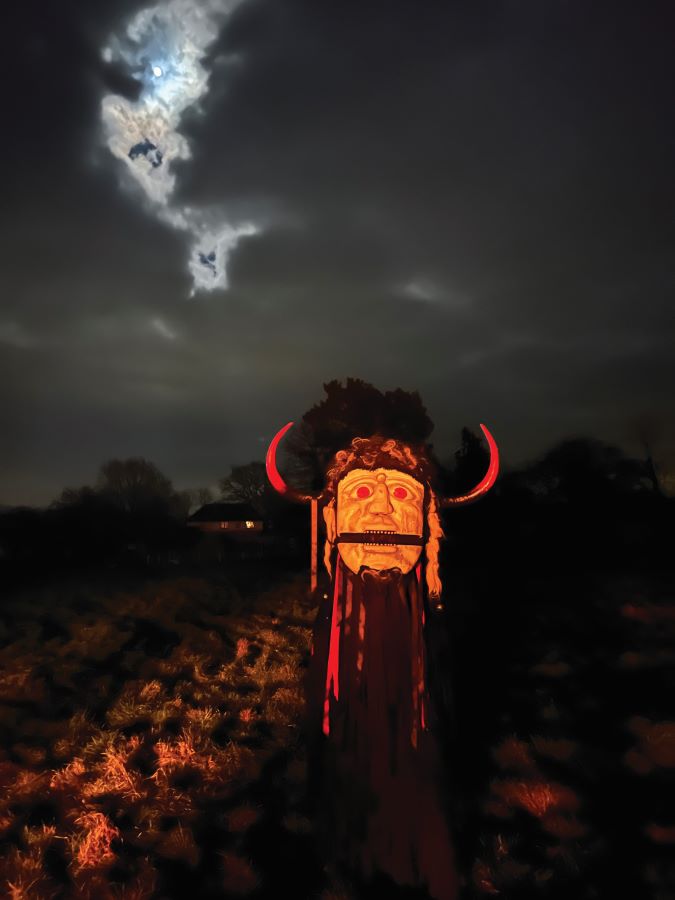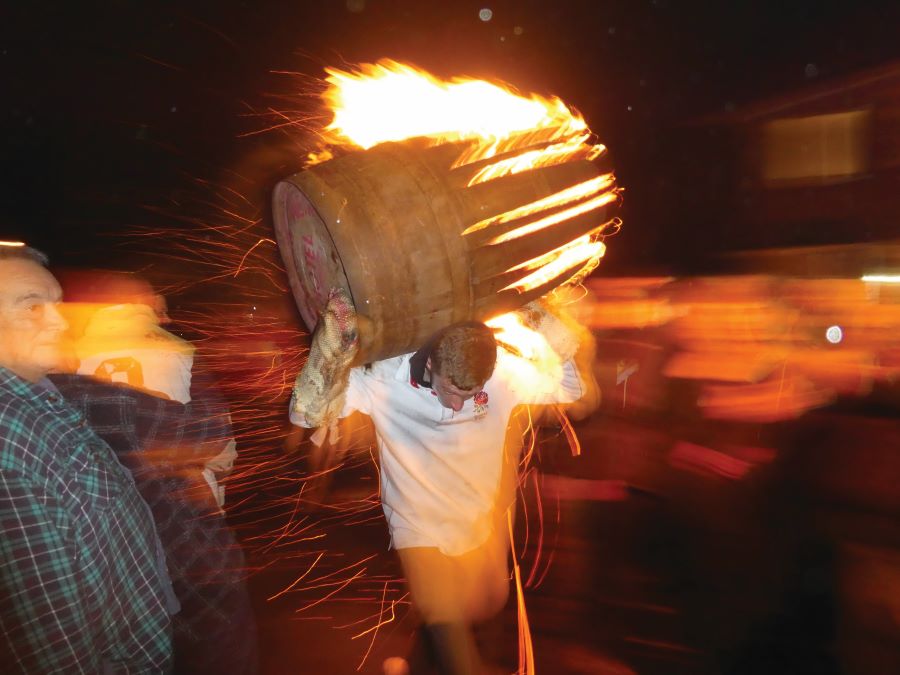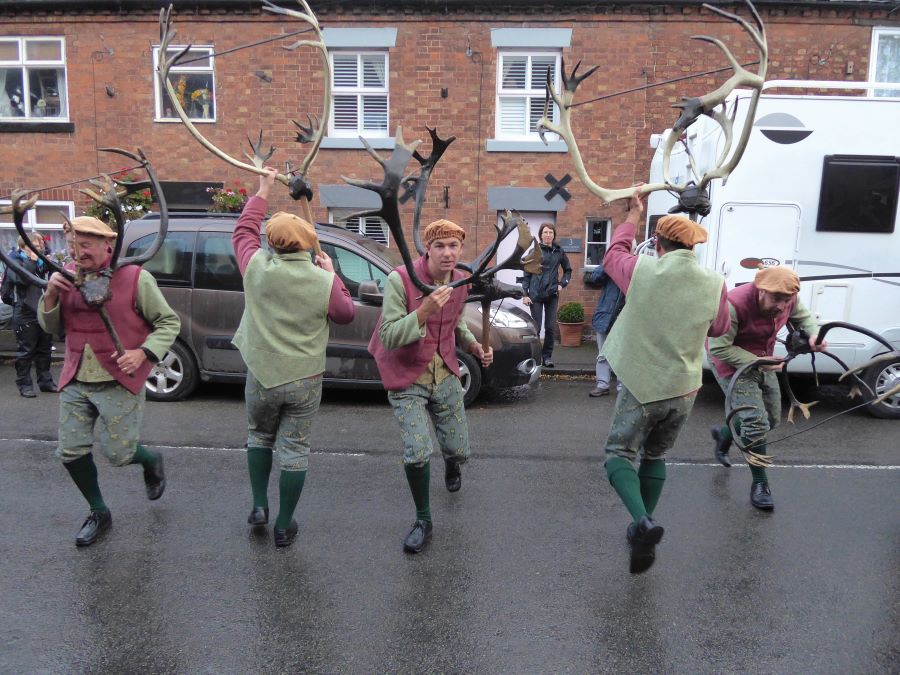Interview with Ben Edge
English Dance and Song December 2024
This news item is based on articles in English Dance and Song, the magazine of the English Folk Dance and Song Society. The world’s oldest magazine for folk music and dance, EDS was first published in 1936 and is essential reading for anyone with a passion for folk arts.
Sammie Squire, Marketing & Communications Director, interviews the author of the new art book and guide to the amazing folk customs and seasonal celebrations of the British ritual year
Congratulations on your book release, Folklore Rising. Why did you choose that title?
Thank you so much. The title really was a nod to the huge resurgence of interest in folklore that we have experienced here in Britain over the past few years. You often hear the term ‘Folk Revival’ being thrown about; I’ve never liked that term, it sounds throwaway, like it will all come crashing down when a new trend comes along. I also find it disrespectful to the generations of people that have kept our folk culture alive. It’s always been there, and this for me, is why it needs to be described as a ‘rising’ – where new generations are going out of their way to connect to the songs, stories and traditions of both their ancestors and the existing custodians, whilst expressing their own individual creativity and making it relevant to themselves today. I also love the idea that folk culture exists outside the establishment, that it is constantly rising, mutating and surviving against all the odds. Our folk culture doesn’t survive because of the establishment, but in spite of it, so I also liked the idea of the title having a revolutionary aspect to it.
Folklore Rising is an art book, and you yourself started out as an artist. How did your obsession with documenting popular folk customs in this country start?
I have always been interested in folklore and capturing the extraordinary lives of ordinary people in my work. However, the discovery of folk customs, and the rich tapestry of traditions taking place nationwide, was brought to my intention through a serendipitous encounter in which I stumbled upon a druid ceremony taking place on Tower Hill, slap bang in the middle of London. There was something about witnessing contemporary people going out of their way to connect with the seasons, nature and the wheel of the year within the urban setting that really awoke something within me. It filled me with hope and I began obsessively researching the seasonal customs of Britain – and became compelled to get out and experience them for myself first hand.
 Ben Edge, Dorset Ooser 2022
Ben Edge, Dorset Ooser 2022
Tell us about how you went through the process of exploring the folk culture and mythologies of this country.
Once I began visiting various traditions across the country, my initial process was to immerse myself within the experience: being there and taking lots of photos from beginning to end. These pictures would then become the source material for my paintings. I also started filming clips on my phone to send to my wife, Rose; she encouraged me to upload them to Instagram. At first, people couldn’t quite comprehend what they were looking at. This was ten years ago, when there was less interest in these events, but as time passed, intrigue and public appetite grew, so my practice evolved and film became a big part of it. After I started documenting the rituals, interviewing locals, and hearing the stories, the local mythologies and the folklore, I decided to use all of this along with my personal experience and interpretation as the basis for the compositions of my paintings and for a full-length feature film titled ‘Frontline Folklore’.
How and when did your folklore adventure begin?
In some ways it began at the moment that I now describe as my ‘druidic epiphany’, but earlier experiences also had a massive influence on me. When I was a child, my grandfather would carve walking sticks with the face of the green man on the handle and take us looking for him in the woods. This really stirred up a fascination for me. Also, when my cousins, who are part of the Tsleil-Waututh First Nation in Canada, would visit us they’d share their mythological creation stories, sing and make blessings to our house, so when I did witness the druid ceremony on Tower Hill years later, it transported me back to these times.
You travelled the length and breadth of the country – from Gloucestershire to meet Boss Morris to Greater Manchester where morris sides flock to pull the famous Saddleworth Rushcart – to record these folk customs alive in our communities. Can you share your most weird and wild discovery from that journey?
I think my wildest discovery was everything that happens around these customs: the nights before in the local pub, as whole rooms sing, play instruments and drink together in unison; or in Padstow walking round the houses in the early hours, night singing as landlords bring out trays of beer. It was that feeling of community and the generosity that you encounter that really blew my mind. I also loved discovering the special places I encountered whilst travelling around: Norman churches with ancient carvings, hill figures and stone circles. It opened my eyes to the rich and thriving, yet often overlooked, folk culture that runs through the blood of Britain.
Storytelling and the passing down of traditions are central to Folklore Rising, including your own real-life family stories. Before you began on this journey, did you ever imagine that you would be sharing stories and anecdotes of your grandfather’s generation in this way?
Within the culture of my family, storytelling and creativity are very much at the centre of it. My father and grandfather would share their stories growing up surrounded by exotic animals in their Brixton council flat, where their pet chimpanzee ‘Primo’ would jump from the balcony onto a passing milk float and scare the life out of the milkman. These stories connected me to something much larger than myself; a lineage that empowered me in my everyday life.
When I first started visiting folk customs and hearing the incredible stories that bound these communities, it really reminded me of my own family – and it felt natural to me to start sharing these stories as part of my own personal folklore and ‘familylore’.

As we address the challenges as a nation with the darker elements of our history and more recently, race riots and a growing nationalist sentiment, why is your book so important in these times?
For me the idea of nationalism is very outdated and a misrepresentation of what is really happening. This notion of a one size fits all monoculture is a misconception. What is great about this country, is its diversity, its regional cultures in which we find a vast array of individual creativity and self-expression, whilst plugging into the very human phenomenon of honouring the seasons and connecting to our universal shared humanity. This is what I am celebrating - in my work and in this book - both the never ending creativity of the human spirit, as well as our collective shared humanity.
Following the popularity of your Frontline Folklore exhibition in 2021, do you think folk culture is being recognised more in the past few years?
Absolutely. When I first began on this journey, there was very little interest outside the communities that practiced them, and this has most definitely changed in recent years. I think this is down to many factors such as people looking for a sense of spirituality without the dogma of religion, the climate crisis inspiring people to actively reconnect to nature in order to look after it better. I also think within creative circles and the art world, it can feel elitist, but within folk culture you can reclaim your own creativity, where it’s celebrated as a joyful act and something for everyone. You can make your own art world. I also feel that the lockdown gave people the time to fall in love with the landscapes and regional cultures that they may not have had time to properly engage with until then. It’s as if people are waking up to the fact that everything that they have been looking for is right on their doorstep – and yours to reclaim, as long as you are willing to actively seek it out. It was there all along…
Folklore Rising: An Artist’s Journal through the British Ritual Year is published by Watkins, priced £25.
For more about Ben Edge, visit: benedge.co.uk
Photos: Ben Edge





